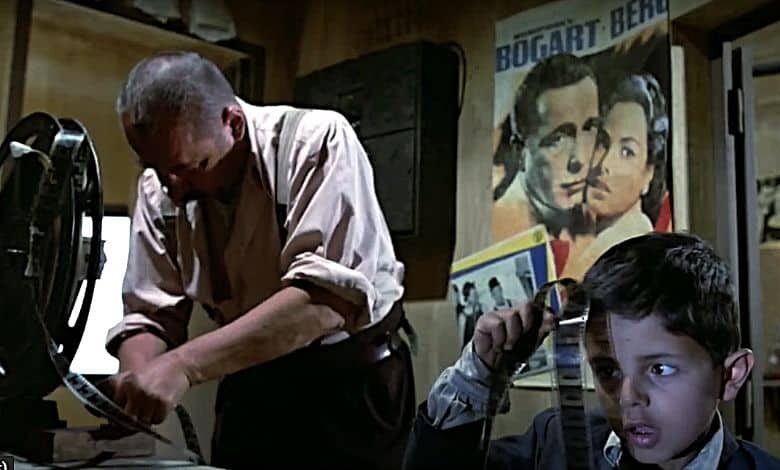Why All Movie Lovers Need to Watch ‘Cinema Paradiso’
The 1988 Italian classic captures the allure, and danger, of the theatrical experience

The disconnect between movies and reality is unavoidable.
Contrary to what we assume from films like “The Breakfast Club,” life offers few fist-raising moments like Judd Nelson’s triumphant scene in that John Hughes classic.
For this reason, the 1988 Italian film “Cinema Paradiso,” a movie which says, “Life isn’t like it is in the movies. Life… is much harder,” is incredibly poignant.
Winner of the Academy Award for Best Foreign Film, “Cinema Paradiso” elegantly portrays the struggle every idealist must eventually face.
Written and directed by Giuseppe Tornatore, it’s the story of Salvatore Di Vita, nicknamed Toto, at three different stages in his life. The movie begins with a middle-aged Toto (Jacques Perrin), a very successful filmmaker, receiving news that his mentor Alfredo (Phillipe Noiret) has died.
With the funeral taking place the following day, Toto reflects upon his youth, knowing he must return home to face the childhood he’s been running from for 30 years.
A flashback begins shortly after the end of World War II, revealing an eight-year-old Toto (Salvatore Cascio). His father died in the war, leaving Toto’s mother to raise both him and his younger sister.
Despite the stark realities of his situation and postwar Europe, Toto finds refuge in the movies. A rambunctious young boy, he discovers a more refined version of reality at the local theater, the Cinema Paradiso.
Although reluctant at first, the theater’s projectionist, Alfredo, is moved by Toto’s passion for the movies. He takes the lad under his wing, becoming a father figure to the boy.
Toto adores the golden age of movies, He idolizes the likes of John Wayne, Jimmy Stewart, Gary Cooper and Spencer Tracy. His deep connection with film is epitomized in his reaction to his father’s death. Having been told his father bore a strong resemblance to Clark Gable, upon learning of his father’s passing he walks by a “Gone with the Wind” poster, smiling at Rhett Butler’s visage.
Again, the movies provide an escape for Toto, allowing him to forget the harsh realities of life if only for an hour or two. And he’s not alone. “Cinema Paradiso” captures the communal experience that moviegoing provides.
Notably, the world of Toto’s childhood is a much more innocent one. The town’s priest receives advance screenings of all new releases, having Alfredo remove moments he deems overly graphic, whether a passionate embrace or a kiss.
It’s a stark contrast to today’s cinematic standards.
So is the sight of audiences in suits and dresses at The Cinema Paradiso, laughing and crying together as one.
FAST FACT: Cascio left movie making behind, later opening a restaurant and guest house in his hometown of Palazzo Adriano, Sicily. That city is also where the bulk of “Cinema Paradiso” was shot.
Yet over time, the values that provide a certain charm to Toto’s childhood begin to shift. The Bogarts and Bergmans of the screen are soon replaced by Bardot and Brando. Whereas the Paradiso used to provide the opportunity for people to come together, as Toto matures into a teenager (Marco Leonardi) and takes over running the projector, it becomes merely a place of business.
Now prostitutes operate there in addition to members of the mafia, the communal joy replaced with the transactional.
And this new reality is something that Toto, a young man now, must face. No longer given to the blissful ignorance of his youth, he begins to see the world for what it is. Whether in a failed romance, his required military service or the declining state of film, he’s frustrated by the chasm between reality and the movies.
At one point, he expresses his desire that the world around him would “fade-out” and “cut to storm.”
His struggle with reality continues into adulthood. Alfredo encourages him to leave home behind forever, never giving way to nostalgia, and to make something of himself. This romantic, binary view which emulates that which he grew up watching ultimately falls short for him.
Toto eventually finds fame as a filmmaker, but there’s no getting away from the difficulties of the real world. His decision not to look back means he neglects the core relationships in his life. His return home forces him to face the consequences.
RELATED: A New Poll Spells Doom for the Theatrical Experience
Toto finds the Paradiso decrepit and abandoned upon his return, with the only remnants of the theater being advertisements for adult films. It’s tragic to see the once-charming theater a shadow of its former self, whether in its physical state or the type of storytelling it represented.
Toto ultimately returns to Rome where he’s given a film reel left behind for him by Alfredo. In the movie’s final scene, Toto sees all the passionate embraces Alfredo was forced to cut by the priest when Toto was a boy, set to Ennio Morricone’s amazing score.
The true and unbridled beauty of storytelling within film is beautifully presented and Toto is moved to tears.
“Cinema Paradiso” acknowledges reality and what has been lost (which is especially notable in today’s day and age) while also celebrating the pure escapism and romanticism of film. It’s a movie dedicated to the struggle and frustration of every cinephile who comes to realize that life oftentimes isn’t like it is in the movies.
Life is, indeed, much harder. But that doesn’t mean movies can’t be loved for what they are.
—————————–
Colin North is a college student from Hudson, Ohio. He hosts the “Scotch and Smoking Jackets” podcast on Spotify, Apple Podcasts and Amazon Music.
